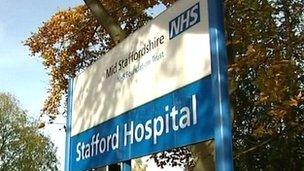Scandal hit Mid Staffs 'faces being dissolved'
- Published

Mid Staffordshire has been at the centre of one of the worst scandals of recent years
The scandal-hit Mid Staffordshire NHS Trust faces being dissolved after regulators announced the administration process was to begin.
The trust has been at the centre of one of the worst scandals in NHS history after neglect and abuse led to hundreds of needless deaths from 2005 to 2008.
Mid Staffordshire has also faced serious financial problems - it got a £20m bailout by government last year.
The regulator Monitor has now decided it should be put into administration.
This means an independent administrator will take over the running of the trust before coming up with proposals for the long-term.
A range of options are available, including closing down the trust altogether. If this happens essential services would be taken on by another organisation.
The administrator could also recommend the trust not be scrapped although it would not exist in its current form.
Monitor has decided "in principle" the process should start, although other bodies need to be consulted before the process officially starts.
That is only expected to take a couple of weeks.
Not sustainable
It is the second time an NHS trust has faced such a process - earlier this year the decision to break up South London Healthcare was agreed.
Mid Staffordshire looks after Stafford and Cannock Chase hospitals.
It was at the Stafford site that "appalling" care led to the deaths of more than 400 patients.
There has been five major investigations into what went wrong, including the public inquiry published earlier this month which criticised the whole NHS for the handling of the problems.
It has also been clear for some time that the trust was struggling financially.
A report by Monitor earlier said in order to break even there would need to be savings of 7% of its yearly budget.
It has now concluded that the trust is neither clinically nor financially sustainable in its current form.
David Bennett, the chief executive of Monitor, said: "We are now consulting on whether to appoint administrators with the expertise to reorganise services in a way which is clinically robust and sustainable.
"Their priority will be to make sure that patients can continue to access the services that they need and they will work with the local community to do this."
Once the administrator is appointed they will have 150 days to come up with proposals for the future of the trust.
The Department of Health in England said the serious financial challenges the trust was facing was "putting at risk its work on improving services".
"It is important that valued local services will last and are able to continue providing high quality treatment and advice for patients," the spokesman added.
Professor John Caldwell, the trust's chairman, said "We have accepted for some time that the trust, working alone cannot produce a long lasting solution to the issues we face.
"We will continue to work with our regulators and commissioners to deliver the services they require to our local community."
Julie Bailey, founder of the campaign group Cure the NHS, which brought the failings at the hospital to national attention, said: "We are obviously distressed. But this was inevitable really."
The news of the administration came on the day the families of victims of the Stafford Hospital scandal protested outside the NHS Commissioning Board HQ in Manchester.
About a dozen people held placards calling for the resignation of NHS Chief Executive Sir David Nicholson.
Sir David was head of the regional authority which oversaw the hospital for some of the period when the poor care took place.
During a meeting of the board chairman Prof Malcolm Grant publicly backed Sir David.
Next week the NHS boss is due to be quizzed by MPs on the health select committee.